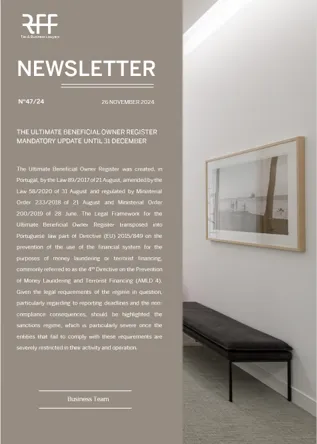The Ultimate Beneficial Owner Register - mandatory update by 31 December

The Ultimate Beneficial Owner Register - mandatory update by 31 December
The Ultimate Beneficial Owner Register was created, in Portugal, by the Law 89/2017 of 21 August, amended by the Law 58/2020 of 31 August and regulated by Ministerial Order 233/2018 of 21 August and Ministerial Order 200/2019 of 28 June. The Legal Framework for the Ultimate Beneficial Owner Register transposed into Portuguese law part of Directive (EU) 2015/849 on the prevention of the use of the financial system for the purposes of money laundering or terrorist financing, commonly referred to as the 4th Directive on the Prevention of Money Laundering and Terrorist Financing (AMLD 4). Given the legal requirements of the regime in question, particularly regarding to reporting deadlines and the non-compliance consequences, should be highlighted the sanctions regime, which is particularly severe once the entities that fail to comply with these requirements are severely restricted in their activity and operation.
FRAMEWORK
The Ultimate Beneficial Owner Register (UBO’s Register) was created, in Portugal, by the Law 89/2017 of 21 August, amended by the Law 58/2020 of 31 August and regulated by Ministerial Order 233/2018 of 21 August and Ministerial Order 200/2019 of 28 June.
The Legal Framework for the Ultimate Beneficial Owner Register transposed into Portuguese law part of Directive (EU) 2015/849 on the prevention of the use of the financial system for the purposes of money laundering or terrorist financing, commonly referred to as the 4th Directive on the Prevention of Money Laundering and Terrorist Financing (AMLD 4).
The Ultimate Beneficial Owner Register is based on a data repository containing accurate and up-to-date information on the ultimate beneficial owners of certain organizations.
The UBO’s Register is primarily an instrument, provided for in AMLD 4, aimed at preventing and combating money laundering and terrorist financing.
Secondly, and in tandem with the adoption of Directive (EU) 2016/2258 (DAC 5), it allows access to and exchange of this information between the tax administrations of the Member States of the European Union, increasing the scrutiny to which tax planning and counselling activities are subject.
The combination, on one hand, of the UBO’s Register and DAC 5 and, on the other hand, of Directive (EU) 2017/822 (DAC 6), which aims to combat abusive tax planning, mainly through the disclosure of tax schemes by intermediaries, results in increased liability for intermediaries who carry out such illicit schemes and, on the other hand, increased transparency around the identification of the owners of each entity's capital.
ULTIMATE BENEFICIAL OWNER
The law establishes that the first criterion for determining the ultimate beneficial owner is the natural person or persons who hold a sufficient percentage of the shares in the company.
However, it is not always possible to determine beneficial ownership based on the criterion of holding a sufficient percentage of the shareholding. For this reason, the law has various criteria for determining beneficial ownership, which must be applied on a subsidiary basis.
Thus, the following persons are ultimate beneficial owners of corporate entities, when they are not companies with shares admitted to trading on a regulated market subject to disclosure requirements in line with European Union law or subject to equivalent international standards that guarantee sufficient transparency of ownership information:
a. The natural person or persons who ultimately own or control, directly or indirectly, a sufficient percentage of the shares or voting rights or participation in the capital of a legal person. In this case, when the client is a corporate entity, the obligated entities:
- They consider the holding by a natural person of shares representing more than 25 per cent of the client's share capital to be evidence of direct ownership.
- They consider the holding of shares representing more than 25 per cent of the client's share capital by (i) a corporate entity under the control of one or more natural persons or (ii) several corporate entities under the control of the same person or the same natural persons to be evidence of indirect ownership.
b. The natural person or persons exercising control by other means over that legal person.
c. The natural person or persons with senior management, if, after all possible means have been exhausted and on condition that there are no grounds for suspicion, (i) no person has been identified in accordance with the previous subparagraphs or (ii) there are doubts that the person or persons identified are the beneficial owners.
In the case of trusts, they are ultimate beneficial owners:
a. The settlor
b. The trustee or trustees of trust funds
c. The trustee, if applicable
d. The beneficiaries or, if they have not yet been determined, the category of persons in whose main interest the trust has been set up or carries out its activity
e. Any other natural person who has ultimate control of the trust through direct or indirect participation or by other means.
In the case of legal persons of a non-corporate nature, such as foundations, or collective interest centres without legal personality of a nature similar to trusts, the beneficial owners are considered to be the natural person or persons with positions equivalent or similar to those mentioned for trusts.
ENTITIES SUBJECT TO UBO’S REGISTER
Once the entities define their ultimate beneficial owners have been determined, they must keep duly updated an accurate record of the information and data to communicate regularly to UBO’s Register.
In this context, the organizations subject to submit the UBO’s declaration are:
a. Associations, cooperatives, foundations, civil and commercial companies, as well as any other personalized collective entities, subject to Portuguese or foreign law, which carry out activities or perform legal acts or business in national territory that require them to obtain a tax identification number (NIF) in Portugal
b. Representations of international or foreign legal entities operating in Portugal
c. Other entities that, pursuing their own objectives and activities that differ from those of their members, are not endowed with legal personality
d. Fiduciary management instruments registered in the Madeira Free Trade Zone (trusts)
e. External financial branches registered in the Madeira Free Trade Zone
f. Fiduciary funds and other collective interest centers without legal personality with a similar structure or functions, when they do not fall under the previous paragraphs, provided that they are assigned a TIN by the Tax and Customs Authority (AT) or are entities obliged to prevent the use of the financial system and activities and professions specially designated for the purposes of money laundering and terrorist financing under the terms of Law no. 83/2017, of 18 Augus
MONITORING AND SANCTIONS
Proof of UBO’s Register must be required to entities in all circumstances that the law requires proof of a regularized tax situation.
In this context, failure by obliged entities to fulfil these obligations is subject to particularly severe sanctions.
On the one hand, a fine between € 1.000 and € 50.000 can be imposed, but above all, and for as long as the reporting and rectification obligations are not fulfilled, non-compliant obliged entities are severely restricted in their activity and operation.
In effect, whenever it is in breach of the requirements of UBO’s Register regime, the entity obliged may not (i) distribute profits or make advances on profits during the financial year, (ii) enter into supply contracts, public works contracts or purchase services and goods with public entities, (iii) renew the term of existing contracts, (iv) bid for the concession of public services, (v) benefit from support from European structural and investment funds and public funds, or (vi) intervene as a party in any business whose object is the transfer of property, whether for a consideration or free of charge, or the creation, acquisition or disposal of any other real rights of enjoyment or guarantee over any immovable property.
Furthermore, the non-compliance situations with the declaration are published on the UBO’s Register website.
Moreover, anyone who makes false declarations for the purposes of the Ultimate Beneficial Owner Register can be held criminally and civilly liable.
TAX IMPLICATIONS
In addition to the implications and penalties mentioned above, there are others of a fiscal nature.
Through the infrastructure of access and exchange of information between tax administrations, particularly through the aforementioned DAC 5 and 6, there will be more incisive monitoring that will encourage a more enlightened application of tax anti-abuse rules, such as the general anti-abuse clause in the General Tax Law, such as the Principal Purpose Test, provided for in the Anti-Tax Abuse Directive (ATAD) and within the framework of the Double Taxation Conventions, in the Multilateral Instrument.
Amongst the potential facilitation of the application of special anti-abuse rules are the following:
a. the tax attribution of income and the transparent tax treatment (flow through) of income held in companies that qualify as a Controlled Foreign Company (CFC)
b. the concept of beneficial owner for the purposes of the Double Taxation Conventions and, possibly, the European Tax Directives. However, it is worth emphasising the historical distinction between the "ultimate" beneficial owner of an entity (Ultimate Beneficial Owner or UBO) and the beneficial owner of a transaction, with an international interpretative and jurisprudential tradition in this regard that does not necessarily associate one concept with the other.
DECLARATION DEADLINES
The initial declaration relating to the beneficial owner must be submitted within 30 days of finalizing the registration of the entity's incorporation.
On the other hand, any subsequent changes/updates to the information contained in the declaration of beneficial owner submitted must be made as soon as possible, but in no case later than 30 days from the date of the event that led to the change.
In addition, there is an annual obligation to update the beneficial owner declaration, which is due by 31 December each year, even if there have been no changes to the data declared.
***
Rogério Fernandes Ferreira
Marta Machado de Almeida
Patrícia Largueiras
Inês Dias de Pinho
Miriam Barbosa
Carolina Gomes Alves
